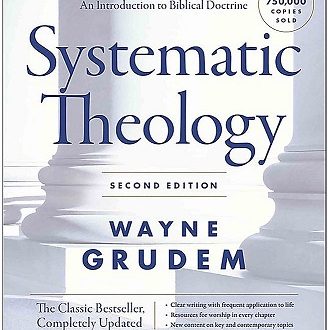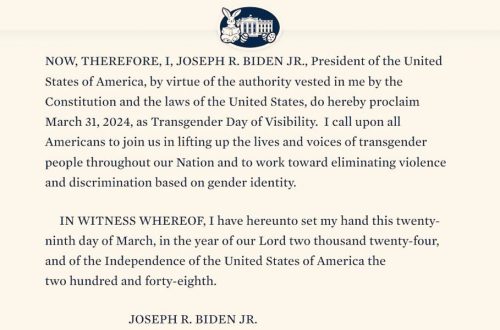 I think I may be in the minority among those of my generation in the SBC. But I breathed a sigh of relief when I read the news last night that the Southern Baptist Convention (SBC) would be sticking with its name. The task force appointed by SBC President Bryant Wright recommended last night that “Southern Baptist Convention” remain our legal name and that “Great Commission Baptists” be adopted as our nickname. I am fine with the nickname, but I have been mainly concerned that our official name stay the same. So I couldn’t be happier about this result.
I think I may be in the minority among those of my generation in the SBC. But I breathed a sigh of relief when I read the news last night that the Southern Baptist Convention (SBC) would be sticking with its name. The task force appointed by SBC President Bryant Wright recommended last night that “Southern Baptist Convention” remain our legal name and that “Great Commission Baptists” be adopted as our nickname. I am fine with the nickname, but I have been mainly concerned that our official name stay the same. So I couldn’t be happier about this result.
If I’m being honest, I have to confess that my preference to keep our name is not altogether motivated by missional concerns. I grew up in Southern Baptist Churches my whole life. I cut my ecclesiastical teeth on Fall revivals, Royal Ambassadors, and one more stanza of “Just As I Am.” Southern Baptists taught me that the gospel was the best news in the world and that I should share that news with as many people as possible. If they were to make a “Wonder Years” program about the life of Denny Burk, fully one-half of the program would be set within a Southern Baptist Church—in particular, the First Baptist Church of DeRidder, Louisiana. So for me, the “Southern” part of the SBC doesn’t conjure up the specter of slavery or segregation. On the contrary, it just makes me think of home. And I don’t hate home. I love it dearly.
So it is not easy for me think of changing the name of the SBC without somehow feeling like I’m losing a connection to the marrow of my life. But my experience is mine alone, and it shouldn’t be the measure of everyone else’s. No matter what my personal history has been, the progress of the gospel should be more important to me than nostalgia. So when the task force for the name change was appointed, I wanted to take seriously the concerns being raised about our name. Perhaps they were right. Perhaps we could accomplish the Great Commission more effectively by leaving behind a name that sounds regional and that has its genesis in our nation’s original sin of slavery. Those racial issues have weighed on the consciences of Southern Baptists for a very long time, and rightly so.
At the end of the day, however, my concerns about the name change were more than mere sentimentality. As the arguments from both sides mounted up, it became clear that changing the name of the SBC would bring on some significant challenges to our denomination. A name change would have expensive legal consequences, some of them foreseeable and some of them not forseeable. Our history has the potential to overpower any effort to rebrand, and so it’s not altogether clear that removing “Southern” from our name would really free us from our past. Also, changing the name would have the potential not only to sever us from the inglorious aspects of our history but also from the glorious ones—our evangelical doctrine, our ethical stances, our commitment to missions, and the conservative resurgence. And perhaps most important of all, a name change debate had the potential to divide Southern Baptists.
For these reasons and more, it seemed to me that the burden of proof for a name change fell on those who wanted to change it, not on those who wanted to keep it the same. And I never heard anything from anyone that persuaded me that the benefits of changing the name would outweigh the costs. Jimmy Draper confirmed my feelings in his report to the Executive Committee when he said precisely that:
We believe that the potential benefits of a name change do not outweigh the potential risks that would be involved in a legal name change. Renaming the Convention would require a great cost in dollars, in energy, as well as re-branding the name to recapture the meaning that our name now represents. The value of the name change does not justify the risks involved.
I couldn’t agree more.
What about the baggage that is associated with the “Southern” part of the SBC? Are we stuck with the negative historical associations now that we are keeping the name? I don’t think so. As someone has recently said, repentance is more important than rebranding. Turning away from our sin will be more compelling to a watching world than any name change would ever be. We need to pray for the Lord to add to our number and to grant that we might look more and more like the congregation in Revelation 5:9—those who praised God for bringing into the church “persons from every tribe and language and people and nation.”
One more thing. To all the Southern Baptists who want to cut ties with the negative associations of the name “Southern,” there is still something for you to do. You need to be in New Orleans this summer to help elect Fred Luter as the first African American president of the SBC. He is a faithful pastor who did not forsake his New Orleans congregation when the going got tough after Hurricane Katrina. He’s the real deal and is just the kind of man we need leading Southern Baptists. It will be a watershed moment in the history of our convention, and it will be one of the most important votes you’ll ever cast. I cannot wait for Fred Luter to be the face of the Southern Baptist Convention. I hope to see you there.




16 Comments
Andrew Lindsey
“Turning away from our sin will be more compelling to a watching world than any name change would ever be.”
-And yet, Saul became Paul upon conversion.
How are the arguments for keeping “Southern” different from the arguments for (to give one example) keeping the Confederate flag as part of Georgia state flag?
Denny Burk
The text gives us no explanation for Paul’s name change, and he’s still called Saul for a while after his conversion. Notice that his conversion is in Acts 9, but he’s still called Saul through 13:9.
Nothing evokes the old confederacy and slavery like the stars and bars, and the word “southern” is not its equivalent in my view. To cite one example, Southern University is one of our nation’s historically black colleges. How could they have such a name if “southern” were as unredeemable some people suggest?
I’m not saying that there are no negative associations with the “southern” part of our name. I’m just saying that the associations may have more to do with our history than with the word itself. I think this is born out in Dr. Ken Fentress’s remarks to the executive committee: http://www.bpnews.net/BPnews.asp?ID=37226.
Don Johnson
Paul did not change his name on conversion. Go back and read the narrative.
Sha’ul was his Hebrew name, which gets translated to Saulos in the Greek NT and Saul in English. Paulos was his Greek name, which gets translated to Paul in English. Saulos has a street Greek meaning of “walk like a prostitute” so this was not a good name to use when witnessing to Greeks, hence Paulos or Paul.
Tom Fillinger
Read my BLOG @ http://www.thetextsays.blogspot.com
Ryan
Hear, hear. And to be honest, the nickname is meh. It seems more suited to an insider pep talk (“It’s Lottie Moon time again, and remember to give – we’re Great Commission Baptists, after all!”) than anything helpful to the outside world… which I believe was one of the main concerns of the name change in the first place.
Andrew Lindsey
re: “as unredeemable as you suggest”
-It wasn’t necessarily a suggestion, but intended as an honest question.
Denny Burk
Roger that. Thanks.
Denny Burk
I changed it to “as unredeemable as some people suggest.” Thanks, brother!
Leo
Denny, you are not in minority. Hope this issue is settled once and for all (and won’t come back every few years again). Let’s move on doing Kingdom’s work.
Steve Hayes
I wish I could share in your joy, Denny. You and I have very similar roots in Southern Baptist life. I grew up in an SBC church (FBC Lake Charles, LA), went to two different SBC colleges (LA College and Criswell), and now pastor an SBC church. I learned all of those things that you mentioned, and I’m very thankful for my SBC heritage.
I also learned how to be a legalist in an SBC church. I learned how to worship monuments and traditions more than Christ. I learned that you can sing and not worship. I learned that committees can be deadly. I learned that being SBC is more important to many people than being Christian.
Sure, I could’ve learned all of those things in another denomination, but my point is that holding on to the “Southern” even when it has become a clear barrier for the lost seems like the same old tradition over substance mindset that has led to declining impact for the SBC over the past decade.
You’re right that a change of actions is really what matters most, but a change of name would’ve demonstrated a change of action more clearly than anything. It’s like saying, “I’m just going to live right and hope that others notice.” What we should do is change our name so that there’s no doubt that our actions will follow the values that our name represents.
Just my opinion.
Andrew Lindsey
Re: “but my point is that holding on to the ‘Southern’ even when it has become a clear barrier for the lost…”
-Do you have any evidence (other than anecdotal) that “Southern” is a barrier? I ask because Dr. Moore argues that polls show that the general public objects to Southern Baptists not due to perceived racism, but due to perceived narrow-mindedness. Then, when asked to elaborate upon “narrow-mindedness,” respondants cite things like “Jesus is the only way to Heaven” or “homosexuality is a sin,” or other positions that most Southern Baptists would readily affirm. (On the other hand, it does at least *seem* to make sense that those in the northeastern U.S. would not want to affiliate with the *Southern* Baptist Convention.)
Kelley Kimble
I’m a Southern Baptist in Arizona. Based on what I hear from friends who attend other churches, legalism, tradition, arguing, biting and devouring one another are things we all struggle with no matter where we attend. We could change our name, but these human frailties would still be with us. The answer is to live Biblically to the best of our ability and to repent when we sin.
Andrew
Kelley is exactly right. Name change or no name change, neither has any effect on who we are as a convention. That is the heart of the matter. People don’t think ill of Southern Baptists because of our name. Some people think ill of Southern Baptists because of our actions and identity. The name change is only window dressing on what our leaders seem to sense is a deeper issue, but can’t seem to put their finger on it.
Eric C. Redmond
Thank you, Denny, for a post with a great and important challenge.
Blessings!
ECR
Denny Burk
Thanks, Eric. Great to hear from you.
Joseph Frech
I do not believe that the average American is as educated concerning the SBC, and would more than likely confuse the SBC with the Fundamental Baptist movement that truly did teach and promote a truer sense of legalism, etc. Christians are likely to be grouped, even unfairly, and Baptists will be no different. The real impact will occur when believers in Jesus Christ live out their faith in a Christ-like way. Changing a name is not likely to produce results equal to that. I like this discussion though.